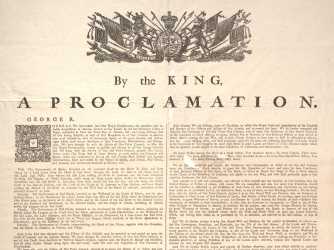*Proclamation of 1763*

Awesome Britain's triumph over France in the Seven Years' War, otherwise called the French and Indian War, gave it control over all of eastern North America. Most local clans had aligned with the French amid the contention, and they soon got themselves disappointed by British run the show. In May 1763, only a couple of months after the formal finish of the Seven Years' War, a dish of innate alliance drove by Ottawa boss Pontiac ascended in insubordination. His warriors assaulted twelve British fortresses, catching eight of them, and struck various outskirts settlements. Hundreds kicked the bucket all the while. Accordingly, the British gave out smallpox-contaminated covers to Pontiac's adherents. Additionally, a group of whites known as the Paxton Boys slaughtered 20 unprotected Native Americans who had nothing to do with the battling.
While trying to keep comparable occurrences from happening, King George III issued an imperial decree on October 7, 1763, which built up three new terrain provinces (Quebec, West Florida, and East Florida), expanded Georgia's southern outskirt and offered land to officers who had battled in the Seven Years' War. All the quieter, it restricted pioneer settlement west of the Appalachian Mountains, at any rate "for the present, and until the point that our further delight is known." Those pilgrims as of now there were requested to move. Recognizing that "extraordinary fakes and misuse have been conferred," the declaration besides restricted people from purchasing an innate domain. Rather, just the crown could now make such buys. "We might keep away from numerous future fights with the savages by this helpful measure," said General Thomas Gage, who ordered every single British power in North America.
The British endeavored to authorize the decree, intermittently ceasing pilgrims as they traveled west and coercively expelling others. On one event, redcoats from Fort Pitt in introduce day Pittsburgh even consumed the cottages of some adjacent pioneers and escorted them back over the limit. Generally, however, pioneers slighted the announcement without dread of discipline. Some needed sufficiently just land for themselves and their families, though others were theorists hoping to make a robust benefit not far off. George Washington, for one, kept in touch with his operator in 1767 with the help of illicitly purchasing however much Native American land as could be expected. The Proclamation of 1763 will soon be renounced, Washington clarified, in light of the fact that—"this I say between ourselves"— it was just signified "as a brief catalyst to calm the brains of the Indians." Other well-known examiners included Patrick Henry, best known for his "Give me freedom or give me passing" discourse, and Henry Laurens, who later filled in as leader of the Continental Congress.
Washington's expectation demonstrated perceptive the next year when the British moved the limit line westbound as a component of the Treaty of Fort Stanwix. Under the arrangement, the Iroquois consented to surrender parts of present-day New York, Pennsylvania, Kentucky, Tennessee and West Virginia in return for money, endowments and the (destined to-be-broken) guarantee of a perpetual outskirt. In any case, in spite of the fact that the Iroquois guaranteed those terrains, they didn't live there. The clans that did, for example, the Shawnee, were goaded and wound up going to war with the British in 1774. In the interim, assist south, the Cherokee surrendered countless square miles in a progression of settlements. Likewise, losing region were the Creeks, who purportedly alluded to the settlers as Ecunnaunuxulgee, or "Individuals eagerly getting a handle on after the terrains of the red individuals."
At last, the new acquisitions neglected to calm frontier discontent with the Proclamation of 1763. Also, however it would be later dominated by different grumblings against the British, for example, the Sugar Act, the Stamp Act, the Townshend Acts, the purported Intolerable Acts and the Boston Massacre, it stayed a sufficient worry that the Declaration of Independence condemned King George III for "raising the states of new assignments of terrains." By winning their flexibility from the British in 1783, the Americans rendered the decree unsettled. Yet, it has lived on right up 'til today in Canada, where it frames the legitimate reason for local land rights. "We should review the expectation that united every one of our progenitors such a significant number of years prior," Shawn An in-chut Atleo, national head of Canada's Assembly of First Nations, said prior today at a 250th commemoration occasion, "and guarantee that [we live up] to the guarantees in the arrangements and different understandings that come from the establishment of the illustrious decree."
Cheers!